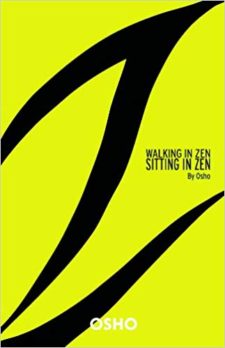
Zen is a very rare flowering – it is one of the strangest things that has happened in the history of consciousness – it is the meeting of Buddha’s experience and Lao Tzu’s experience. Buddha, after all, was part of the Indian heritage: he spoke the language of philosophy; he is perfectly clear, you can understand him. In fact, he avoided all metaphysical questions; he was very simple, clear, logical. But his experience was not of the mind. He was trying to destroy your philosophy by providing you with a negative philosophy. Just as you can take out a thorn from your foot with another thorn, Buddha’s effort was to take out the philosophy from your mind with another philosophy. Once the first thorn has been taken out, both thorns can be thrown away and you will be beyond mind.
Meeting of Buddha’s and Lao Tzu’s experience
But when Buddha’s teachings reached China a tremendously beautiful thing happened: a crossbreeding happened. In China, Lao Tzu has given his experience of Tao in a totally non-philosophical way, in a very absurd way, in a very illogical way. But when the Buddhist meditators, Buddhist mystics, met the Taoist mystics they immediately could understand each other heart to heart, not mind to mind. They could feel the same vibe, they could see that the same inner world had opened, they could smell the same fragrance. And they came closer, and by their coming closer, by their meetings and merging with each other, something new started growing up; that is Zen. It has both the beauty of Buddha and the beauty of Lao Tzu; it is the child of both. Such a meeting has never happened before or since.

Walking in Zen Sitting in Zen
‘Walking in Zen Sitting in Zen’, een nieuwe herdruk die onlangs in Pune verschenen is. Het boek is lange tijd uitverkocht geweest, maar nu dus weer beschikbaar. Het betreft een serie lichtvoetige  toespraken van Osho die het commentaar vormen op Zen meester Yoka. Uitgelegd wordt dat meditatie geen dagelijkse discipline is, maar een levenslange liefdesaffaire. Ook worden er vragen beantwoord van zoekers die gaan over zelf-acceptatie, moed, het verlangen naar het goddelijke, chaos, seks en het spirituele ontwaken.
toespraken van Osho die het commentaar vormen op Zen meester Yoka. Uitgelegd wordt dat meditatie geen dagelijkse discipline is, maar een levenslange liefdesaffaire. Ook worden er vragen beantwoord van zoekers die gaan over zelf-acceptatie, moed, het verlangen naar het goddelijke, chaos, seks en het spirituele ontwaken.
Over De Chinese meester Yoka Daishi werd gezegd dat hij in een staat van perfecte rust was terwijl hij liep, stond, zat en terneer lag. Volgens de legende bereikte hij complete realisatie in een nacht en werd hij aldus genoemd: “meester van de verlichting in een nacht.”
Osho beschrijft Yoka als een Zen Meester met grote bekwaamheid; zijn woorden waren hoewel geweldig mooi, zonder compromis.
Zijn diepe respect en compassie voor je is zodanig dat hij je nu wil laten ontwaken; hij verplettert al je dromen. Osho gaat hand in hand met Yoka’s nadruk dat de mens van Zen buitengewoon is in zijn ‘gewoon zijn’: hij loopt in Zen, hij zit in Zen.
Impression of Walking in Zen Sitting in Zen
Osho,
I cannot understand the philosophy of Zen. What should I do to understand it?
Zen is not a philosophy at all. To approach Zen as if it is a philosophy is to begin in a wrong way from the very beginning. A philosophy is something of the mind; Zen is totally beyond the mind. Zen is the process of going above the mind, far away from the mind; it is the process of transcendence, of surpassing the mind. You cannot understand it by the mind, mind has no function in it.
Zen is a state of no-mind, that has to be remembered. It is not Vedanta. Vedanta is a philosophy; you can understand it perfectly well. Zen is not even Buddhism; Buddhism is also a philosophy.
ZEN is a Rare FLOWERING
Zen is a very rare flowering – it is one of the strangest things that has happened in the history of consciousness – it is the meeting of Buddha’s experience and Lao Tzu’s experience. Buddha, after all, was part of the Indian heritage: he spoke the language of philosophy; he is perfectly clear, you can understand him. In fact, he avoided all metaphysical questions; he was very simple, clear, logical. But his experience was not of the mind. He was trying to destroy your philosophy by providing you with a negative philosophy. Just as you can take out a thorn from your foot with another thorn, Buddha’s effort was to take out the philosophy from your mind with another philosophy. Once the first thorn has been taken out, both thorns can be thrown away and you will be beyond mind.
But when Buddha’s teachings reached China a tremendously beautiful thing happened: a crossbreeding happened. In China, Lao Tzu has given his experience of Tao in a totally non-philosophical way, in a very absurd way, in a very illogical way. But when the Buddhist meditators, Buddhist mystics, met the Taoist mystics they immediately could understand each other heart to heart, not mind to mind. They could feel the same vibe, they could see that the same inner world had opened, they could smell the same fragrance. And they came closer, and by their coming closer, by their meetings and merging with each other, something new started growing up; that is Zen. It has both the beauty of Buddha and the beauty of Lao Tzu; it is the child of both. Such a meeting has never happened before or since.
Zen is neither Taoist nor Buddhist
Zen is neither Taoist nor Buddhist. It is both and neither. Hence the traditional Buddhists reject Zen and the traditional Taoists also reject Zen. For the traditional Buddhist it is absurd, for the traditional Taoist it is too philosophical, but to those who are really interested in meditation, Zen is an experience. It is neither absurd nor philosophical because both are terms of the mind. It is something transcendental.
Osho, Walking in Zen Sitting in Zen, Talk #15
To understand Zen you need not make a philosophical effort; you have to go deep into meditation. And what is meditation all about? Meditation is a jump from the mind into no-mind, from thoughts to no-thought. Mind means thinking, no-mind means pure awareness. One simply is aware. Only then will you be able to understand Zen – through experience, not through any intellectual effort.
Osho, Walking in Zen Sitting in Zen, Talk #16